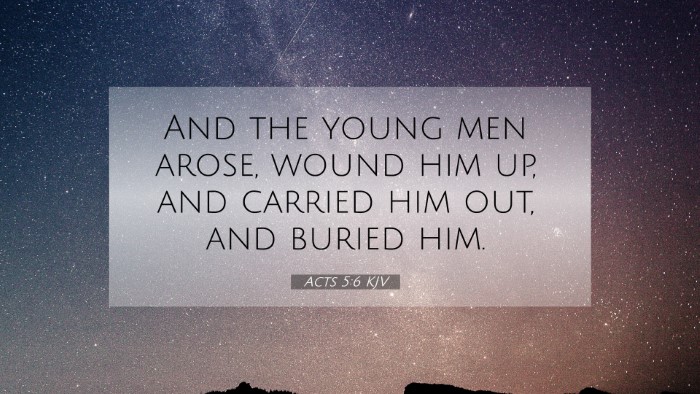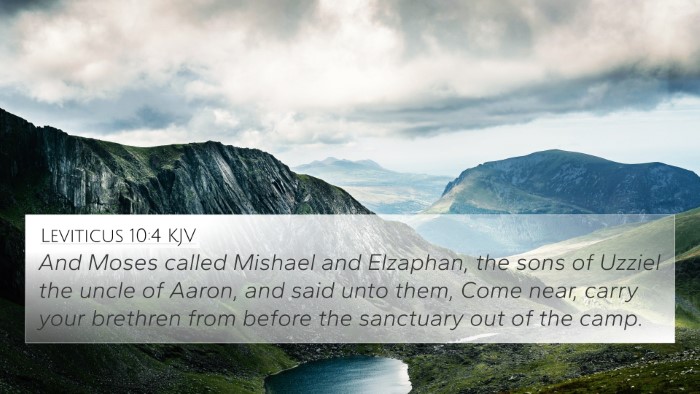Understanding Acts 5:6
Acts 5:6 details the dramatic response of the young men to the death of Ananias after his deceit regarding the sale of property. This verse states:
"And the young men arose, wound him up, and carried him out, and buried him."
Summary of the Verse's Meaning
This verse marks a moment of both reverence and fear within the early church and illustrates the severe consequences of lying to the Holy Spirit. The straightforward act of carrying out Ananias to bury him highlights the seriousness of his sin and the swift judgment that God enacted. There are several themes to unpack:
- Judgment and Accountability: This event emphasizes that God is aware of human actions, and there are consequences for deceit and hypocrisy.
- The Role of Community: The young men acted collectively in burying Ananias, showcasing the community's involvement in dealing with sin.
- Respect for the Dead: Even in judgment, there is an air of respect given to Ananias, reflected in the proper burial.
Cross-Referencing Related Bible Verses
This verse connects to several others in the Bible that address themes of truth, deception, and divine judgment. Here are some notable cross-references:
- Acts 5:1-3: The story of Ananias and Sapphira begins here, showcasing the gravity of their choice to lie to the apostles.
- Galatians 6:7: "Do not be deceived: God is not mocked, for whatever a man sows, that will he also reap." This reinforces the principle of accountability for one's actions.
- 1 Corinthians 11:30: "For this reason many are weak and sick among you, and many sleep." Paul indicates that divine judgment can cause physical manifestations in a believer's life.
- Revelation 21:8: A warning against liars being cast into the lake of fire, indicating the end result of dishonesty.
- 1 John 5:16: Talks about sin leading to death, which can be seen as a parallel to Ananias' act of deceit leading to his demise.
- Proverbs 12:22: "Lying lips are an abomination to the Lord, but those who deal truthfully are His delight." This echoes the importance of truth in the life of a believer.
- Luke 12:2-3: Jesus taught that nothing is covered that will not be revealed, reinforcing the idea that deceit will ultimately come to light.
Insights from Public Domain Commentaries
Matthew Henry explains the seriousness of Ananias’ transgression, noting how this event served to instill a deeper reverence for God within the early church. He emphasizes the swift consequences and the fear it instilled in the hearts of the people.
Albert Barnes notes that the actions of the young men were indicative of the gravity with which the early church viewed sin. Their prompt burial of Ananias can be seen as a reflection of biblical customs surrounding death and respect for the deceased.
Adam Clarke emphasizes that this act serves as a warning to the early Christians against hypocrisy and deceit. He relates this event to the ongoing theme of divine judgment throughout the scripture.
Thematic Connections
This verse can be connected to broader thematic discussions within the Bible, including but not limited to:
- Divine Justice: The narrative exemplifies God's justice and truth in contrast to human deceit.
- Community and Accountability: The collective action taken by the young men shows the importance of community in the early church.
- Mortality and Judgment: This moment serves as a reminder of the spiritual and mortal consequences of our actions.
Tools for Cross-Referencing Scripture
For those seeking a deeper understanding of Acts 5:6 and its interconnectedness with other biblical texts, consider utilizing:
- Bible Concordances: A valuable resource for finding relevant cross-references.
- Bible Cross-Reference Guides: Helpful for navigating thematic connections across scripture.
- Cross-reference Bible Study Methods: Various methods exist for exploring scriptural parallels effectively.
- Comprehensive Bible Cross-Reference Materials: Tools that offer extensive lists of connections can enrich your study.
Conclusion
Acts 5:6 is a powerful scripture that resonates through its themes of truth, accountability, and the serious repercussions of sin, fostering an understanding of God's holiness. As we explore this verse alongside its cross-references, we can glean deeper insights into the character of God and the nature of the early church community.






